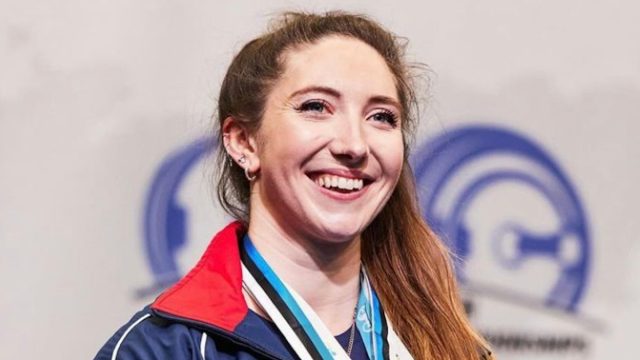Powerlifter Sophia Ellis in Two-Piece Workout Gear Says “We Out Here”

Sophia Ellis is sand boarding in South Africa – in her two-piece workout gear. In a new social media post the powerlifter takes a much-needed break from the gym for a day of fun on the sand dunes. “We out here,” she writes in the Instagram caption, sharing photos and videos of her adventurous afternoon. How does she approach diet, fitness, and self-care? Here is everything you need to know about her lifestyle habits.
From Eating Disorder to Powerlifting
Sophia struggled with an eating disorder for six years, before collapsing one day with a dangerously low heart rate. After being discharged from the hospital, she found the gym, started lifting weights, and decided to be strong instead of skinny. “I had no idea what it was, but I joined the powerlifting club,” she says in an interview with MyLondon. “From there I started competing – within four weeks of actually starting powerlifting I did my first competition, and then qualified for nationals in my first competition, as you do.” She added to Female First: “Powerlifting helped to change my mindset; It allowed me to get excited about what my body is capable of, instead of focusing on what it looks like all of the time. You are not judged on your looks, your ethnicity, your size etc; its objective, you can either lift the weight or can’t. That’s what I love about it, you are showing just raw strength.”
Tips for Developing Long Term Healthy Habits in Strength Training
In a recent social media post Sophia reveals “3 top tips to develop long term healthy habits in strength training. First, she says that “consistency is key.” Her second tip is to set “specific, realistic & achievable goals.” And lastly, “prioritize rest and recovery,” she says, “and don’t forget to enjoy the process! By following these tips and staying committed to your strength training routine, you can develop long-term healthy habits that will help you achieve your fitness goals and maintain a strong and healthy body in the long run. Here’s to more gains!”
Vegan Diet
“Veganism really helped me to build a better relationship with food and opened me up to a very supportive community that made health a priority,” Ellis told Chron. “Being vegan was always frowned upon in eating disorder units and has a bad rep with anorexia – but it shouldn’t at all. It helped me so much. I want my followers to not take their health for granted and ensure that they not only nourish their bodies with healthy food and exercise, but to look after their mental wellbeing. I also want eating disorder sufferers to know they aren’t alone and there is a way out.”
Yoga
In addition to lifting weights, Sophia does yoga. There is a laundry list of reasons to do yoga, explains Harvard Health. “Researchers found that people who practiced yoga for at least 30 minutes once a week for at least four years, gained less weight during middle adulthood,” they said. “People who were overweight actually lost weight. Overall, those who practiced yoga had lower body mass indexes (BMIs) compared with those who did not practice yoga. Researchers attributed this to mindfulness. Mindful eating can lead to a more positive relationship with food and eating.”
Protein
Sophia makes sure to eat enough protein. “There are plenty of plant-based proteins out there, and I aim to get protein from multiple different sources to maintain a well-balanced diet. The ones I tend to eat the most are seitan, tofu, tempeh, alternative meats/ soy products and vegan protein shakes for convenience,” she told Female First.




